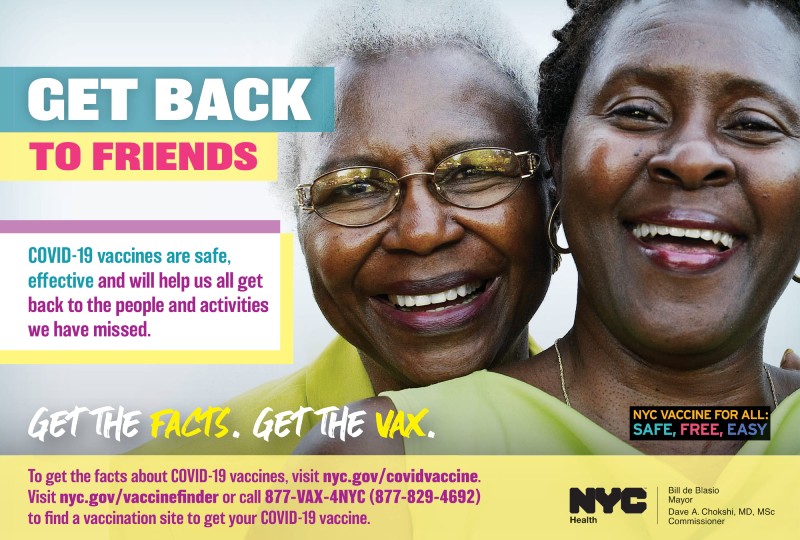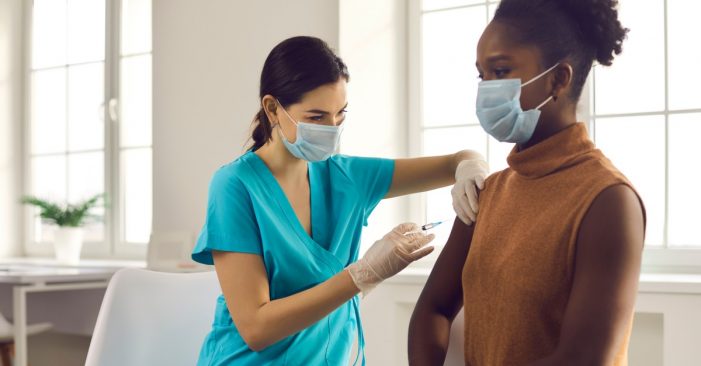By Linda Nwoke, Special to CAW
Did you know that recent reports between March and April cited an increase in the hospitalization rates of teenagers aged 12 and above with Covid-19? This report made Rochelle Walensky, the Director of the Centers for Disease Control and Prevention, urge parents with eligible children to get them vaccinated against a potentially severe illness.
According to the report, one-third of infected adolescents are treated at the intensive care unit. More than 70% of the hospitalized teens had at least one underlying condition; a minimum of 2 out of 3 teens in the situation was black or Hispanic.
“I am deeply concerned by the numbers of hospitalized adolescents and saddened to see the numbers of adolescents who required treatment in intensive care units or mechanical ventilation…parents should get their teens vaccinated,” Walensky said.
As part of the campaign to address the concern, a series of program activities was organized from June to the 7th, dubbed ‘Youth Vaccine Week’ in New York City. The program aimed to raise awareness through information, engage in outreach activities and provide support around vaccinations.
The city partnered with cultural institutions and community-based organizations to organize activities across the city that educate the public and families on the safety and efficacy of the Pfizer COVID-19 vaccine, authorized for people 12 years and older.
The Roundtable
The New York City Health Department and MOIA (Mayor’s Office of Immigrant Affairs ) Host Community also held a roundtable to address some of the frequently asked questions and concerns often raised about the Pfizer COVID-19 vaccine among youths. This was to serve as a contribution to the ongoing creating awareness campaign.
Facilitated by May Malik, Deputy Commissioner, the NYC Mayor’s Office of Immigrant Affairs, asked participants questions about safety, accessibility, engagement, and challenges regarding the vaccine among their target audience.
It is essential to remember that in New York City, the ‘no need for appointment’ to get vaccinated campaign has been in effect for several weeks. In particular, scheduled appointments are not required at City vaccination sites to get a vaccine. However, if preferred, make appointments by calling 877-VAX-4NYC or visiting vax4nyc.NYC.gov.
However, the improvement in accessibility hinges on a few documentation requirements; for instance, you must complete a NY State COVID-19 Vaccine Form and present the completed form with proof of age (such as IDNYC- additional guidelines for getting an IDNYC card is on the nyc.gov website).
For underage children between 12 to 17, parents or guardians must provide consent either in-person, over the phone, or in written form.
Moreover, underage kids between 12-15 must be accompanied by an adult to the vaccination site (additional information on requirements is on the NYC Department of Health website).
Some of the resource persons, Dr. Daniel Stephens, Deputy Commissioner for the Division of Family and Child Health and T’Shone Skeete, Group Leader and test & trace Advocate, the Child Center of NY, shared insights from working with children, teens, and young people regarding the vaccine.
Dr. Daniel Stephens expressed excitement at the progress made over a year since the pandemic broke. As a pediatrician, he understands parental anxiety over the vaccine. He explained that despite the skepticism, the vaccine remains safe and a better alternative to kids contracting the illness.
In confirmation, T’Shone Skeete shared his experience getting the vaccine, how he confronted his fear of needles and took the challenge of taking the vaccine. “…I overcame and conquered my fear and did it by telling myself to relax, relax, relax.” An experience he documented in his Tik Tok video to encourage other youths.

Key Concerns on Youth COVID-19 Vaccination
Addressing some of the common questions parents ask about the vaccine, Dr. Daniel reiterated that the vaccine production follows the highest medical standards. Yet, the focus should be on the ability of the vaccine to protect the child and their loved ones. “… It is important to remember that children have been ill due to COVID… Children live in context; they live in New York and can pass the virus to others. So, the vaccine will serve the purpose of both protecting the child and young person, and preventing them from passing it on to other loved ones in the family.”
He explains that getting teens and youths vaccinated contributes to an actual reduction in disease burden since the disease exists in a spectrum of mild to extreme illnesses. Hence, the functional advantage of taking the vaccine is that we see a return to children being able to participate in activities after all the restrictions caused by COVID. “After vaccination, young people can meet with others and participate in group activities. It is just as important and valid as a benefit which goes beyond the medical benefits.” Says Dr. Stephens.
Using the shield-armor analogy, T’Shone shared his strategy for explaining the importance of taking the vaccine, especially to the young ones. “…Think of your amour as your immune system … think of the vaccine as the shield. Even though you have your armor, why don’t you use your shield? And that can protect you even more”.
He also explained other ways to engage youths through virtual town halls on zoom, engaging interactive and fun-filled activities, inviting health personnel to address concerns, and using real-life experiences.
Above all, social media has proven to be the most effective outreach strategy for reaching young people. “Social media is the biggest platform, using the hashtag, Instagram, short clip, videos, something funny and informational. Without social media, we won’t have the necessary information. Videos must be bright and colorful, including music with dance. So social media is the biggest way to reach the youth,” says T’Shone.
Responding to other issues, Dr. Stephens addressed concerns about clinical trials in children, side effects, and duration of immunity. He explained the reason behind the medically protective class group, which led to the stratified eligibility to the vaccine, “It’s about safety and protecting our protective classes because they are younger, the clinical trials with young people are considered underage, and it takes time. By the end of the year, we may see it with younger people below 12 years”.
He clarified that the side effect profile for children and young people is similar to adults who took the vaccine and consistent with evidence that the vaccine offers protection for at least six months after completing the vaccination dose. He discouraged the use of any pain relief before receiving the vaccine to increase efficiency.
Call to Action
While 8% have collected at least one dose, only 2% have collected two doses in the past month so far in the city. There is much optimism that people will realize that the vaccine’s benefit far outweighs any concern in the long run, including the fear that it causes heart disease in children. This theory is being investigated.
“In a small number, there have been cases of myocarditis, but there is not a link to show causality between the vaccine and effect. The CDC is investigating the issue, but what we know is that myocarditis is an effect of COVID”. Meaning that the virus can lead to a heart condition if contracted before the vaccination.
The message to all eligible New Yorkers, 12 years and older, is to get a COVID-19 vaccine to protect yourself and the people you care about!
In the words of a young person, T’Shone Skeete, who faced a similar situation, “Get vaccinated so that we can all go back to normal. The vaccine is one way out of getting back to normal.”

